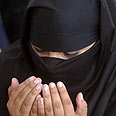
Turkish MPs enter parliament with headscarves
Four female members of Prime Minister Erdogan's Islamic-leaning AKP party wear head covers as longstanding ban in country is lifted
Four female lawmakers from Turkey's Islamist-rooted ruling party wore Islamic head scarves in parliament on Thursday in a challenge to the country's secular tradition.
Fellow Justice and Development Party (AKP) lawmakers kissed and hugged the women as they took their seats in the general assembly.
Secularist opponents made only subdued protests, a far cry from chaotic scenes in 1999, the last time a female MP wore a head scarf in parliament.
Related stories:
- Turkey lifts decades-old ban on Islamic headscarf
- Southern Swiss voters back ban on full-face veils
- German court: Muslim girl can swim in 'burkini'
The head scarf is an emotive symbol in Turkey, viewed by secularists as the emblem of political Islam and its appearance in public life as an affront to the Turkish Republic's secular foundations set up by founding father Mustafa Kemal Ataturk.
There are no specific restrictions on wearing the head scarf in parliament. But opposition from secularists as well as a ban in other state institutions, which was lifted this month, have previously deterred women from wearing them.
"We are going to witness the start of an important era and we will play the leading role, we will be the standard-bearers, this is very important," Nurcan Dalbudak, one of the four AKP lawmakers, told Reuters before attending parliament.
Turkey's main opposition and secularist Republican People's Party (CHP), which said it would contest the move, put up little resistance on the day. One MP wore a t-shirt picturing the face of Ataturk and the Turkish flag in protest while others offered sporadic jeers.
'This is a positive development'
The lawmakers' action took place only weeks after the AKP lifted a decades-old ban on women wearing the head scarf in state institutions as part of a package of reforms the government says are meant to improve democracy.
But the debate goes to the heart of tensions between religious and secular elites, a faultline in Turkish public life.
Restrictions on head scarves at universities have already been eased under the AKP and critics of Prime Minister Tayyip Erdogan point to this and other policies - such as restrictions on the sale of alcohol - as proof his party is seeking to erode the secular order of the republic built on the ruins of an Ottoman theocracy by Ataturk in 1923.
Supporters of Erdogan, whose wife also wears the head scarf,
say the Turkish leader is simply redressing the balance and restoring freedom of religious expression to a Muslim majority.
But opponents accuse the AKP of using the head scarf for political gain and to garner support ahead of an election cycle.
"You only have one asset and we will not allow you to use this to play the victim," Muharrem Ince, a prominent CHP deputy told the assembly, saying the four women had never stood up before in parliament to defend the rights of other women.
Dalbudak dismissed the accusations, saying her decision had been based solely on personal belief.
"I am very happy and proud because I am completing one of the foremost duties required of me. I am experiencing an inner peace because of this," she told Reuters. "This has nothing to do with investing in an election."
Their action was also a sign of changing times set against the unruly scenes of 1999, when Merve Kavakci, an MP from the Islamist Virtue Party, a forerunner to AKP, wore the head scarf to a swearing-in ceremony.
The prime minister Bulent Ecevit told the assembly: "This is not the place to challenge the state. Inform this woman of her limits!". Half the chamber stood shouting: "Get out! Get out!" to the seated Kavakci.
The assembly was adjourned and Kavakci was forced to leave the chamber without taking her oath. She was later stripped of her Turkish citizenship after she was found to have taken dual American citizenship without informing the authorities.
The Virtue Party was closed down in 2001 for violating the secularist articles of the constitution and several lawmakers, including Kavakci, were banned from politics for five years.
Nazli Ilicak, then a fellow Virtue Party lawmaker who was sitting next to Kavakci in parliament before she was expelled, welcomed the AKP MPs' action on Thursday.
"This is a positive development. People are now a little embarrassed about what they did in the past," Ilicak told Reuters.
- Receive Ynetnews updates directly to your desktop










